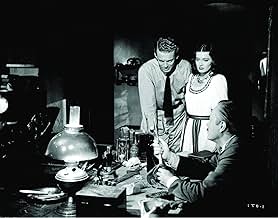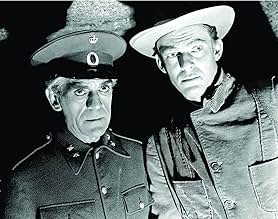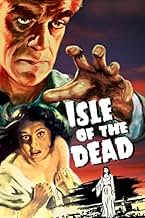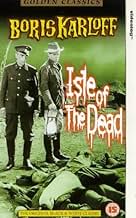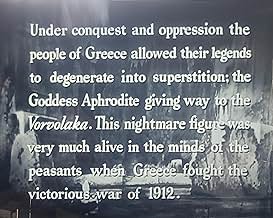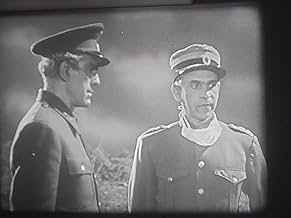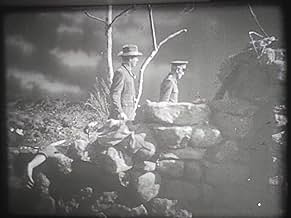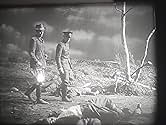IMDb-BEWERTUNG
6,5/10
5573
IHRE BEWERTUNG
Füge eine Handlung in deiner Sprache hinzuA Greek general takes leave from the 1912 Balkan War to visit a small island in Greece, where his wife is buried. A plague soon breaks out and he is forced to stay when quarantine is declare... Alles lesenA Greek general takes leave from the 1912 Balkan War to visit a small island in Greece, where his wife is buried. A plague soon breaks out and he is forced to stay when quarantine is declared.A Greek general takes leave from the 1912 Balkan War to visit a small island in Greece, where his wife is buried. A plague soon breaks out and he is forced to stay when quarantine is declared.
- Regie
- Drehbuch
- Hauptbesetzung
- Auszeichnungen
- 2 Nominierungen insgesamt
Jason Robards Sr.
- Albrecht
- (as Jason Robards)
Ernst Deutsch
- Dr. Drossos
- (as Ernst Dorian)
Sherry Hall
- Col. Kobestes
- (Nicht genannt)
Erick Hanson
- Officer
- (Nicht genannt)
Rose Hobart
- Mrs. Mary St. Aubyn (in long shot)
- (Nicht genannt)
Skelton Knaggs
- Andrew Robbins
- (Nicht genannt)
Empfohlene Bewertungen
BORIS KARLOFF is a Greek general whose wife's body has mysteriously vanished from its tomb at the start of ISLE OF THE DEAD. He's naturally suspicious that something more evil than the plague has crept over the island he decides must be quarantined--forbidding anyone from leaving it. ELLEN DREW is a young woman he suspects may have something to do with evil spirits--or even vampirism--and MARC CRAMER is a young soldier who wants to protect her.
All the ingredients for a good chiller are here, but it's a story that gets its main strength, not from the plot, but from the sinister, shadowy B&W photography that sets up the moody atmosphere from the start, with an air of dread lingering over every scene.
Aiding considerably are strong performances from KATHERINE EMERY as a sick woman who fears being buried alive, and HELEN THIMIG as a superstitious old woman. In fact, all of the supporting players do well under Mark Robson's taut direction.
The tale itself is not one of my favorites but it's a credit to all concerned that they do a job of giving it a creepiness that should satisfy even the most jaded of Gothic horror fans.
And yet, ultimately, there's a bit of a letdown as far as the story itself is concerned. The ingredients are all there, but something vital is missing and I'm sorry to say I don't know exactly what it is.
Nevertheless, holds the interest throughout.
All the ingredients for a good chiller are here, but it's a story that gets its main strength, not from the plot, but from the sinister, shadowy B&W photography that sets up the moody atmosphere from the start, with an air of dread lingering over every scene.
Aiding considerably are strong performances from KATHERINE EMERY as a sick woman who fears being buried alive, and HELEN THIMIG as a superstitious old woman. In fact, all of the supporting players do well under Mark Robson's taut direction.
The tale itself is not one of my favorites but it's a credit to all concerned that they do a job of giving it a creepiness that should satisfy even the most jaded of Gothic horror fans.
And yet, ultimately, there's a bit of a letdown as far as the story itself is concerned. The ingredients are all there, but something vital is missing and I'm sorry to say I don't know exactly what it is.
Nevertheless, holds the interest throughout.
When searching and looking up movies on the IMDb I'll often come across movies and think to myself that 'this one should be a little bit higher,' or 'that one should be a little bit lower' -- generally speaking I'm pretty comfortable with the ratings that I see. Every now and then though I find a rating that just absolutely mystifies me. Did the people who voted watch the same movie that I did? The number is an extreme from where I think the film actually belongs. For me, Val Lewton's 'Isle of the Dead' is one of those films. It currently has a rating of 6.4 and when I saw that I was stunned to say the very least.
I first saw this movie on late night BBC (I was living in England at the time) a couple of years ago. It has stayed with me ever since. I love old movies and horror movies are one of the kinds of film that I actively seek out and watch. 'Isle of the Dead' had a lot of competition if it wanted to have any lasting impact with me. It left a great impression and is the reason that years later I've sought out the rest of Val Lewton's work. 'Isle of the Dead' remains my favourite and I truly hope that people will give it another look.
Let me start with the setting. When I originally watched it I thought it was so fresh and original to set a horror film during the Balkan's war in 1912. I can't think of any other films that have done that before or since. You get a very morbid opening scene that reveals a great deal about Karloff's character. He doesn't instruct a sub-ordinate to commit suicide, but he publicly humiliates them and pushes a revolver towards them after making it quite clear that their military career is over. He has an extreme sense of duty, justice and obligation. Fail, in his eyes, and you'll pay a deep price. He's also very protective in his nature -- especially of the men who he commands. He is modern in his approach. Reason and logic are his weapons but superstition and a sense of obligation are his foundation. This is the man who will be trapped and quarantined on an island with a group of travellers and strangers while a plague, or something more sinister, slowly kills each of them off.
The movie is extremely claustrophobic and very well done. They can see the mainland but can't go to it. They are trapped in their own rooms -- alone -- or in the house with the other quarantees. The doctor will try to save them. Science, reason and logic -- the General's core -- will protect them. But when that core begins to fail, he is influenced by superstition, folklore and hysteria ... and acts accordingly. It is a terrific part for Karloff and the General is a great character study. The psychological depth is wonderful. There MUST be a rational explanation for the deaths. They try, and fail, to fight plague-like symptoms by using plague preventative techniques. He is so wedded to finding rational solutions that when confronted with their failure, paradoxically, he decides that the rational solution must be supernatural agents at work.
'Willing Suspension of Disbelief,' seems to be an unfamiliar concept for some of the film's naysayers. The film is unbelievable because people from different countries appear to be able to converse -- without difficulty -- in one language. It is in Greece and the only non-Greek characters are a British diplomat and his wife (may we presume that being a diplomat to Greece, knowledge of how to speak it MIGHT be advantageous?) an American reporter covering the war and a Greek general (since he doesn't have an interpreter, MIGHT he not have some knowledge of the language?), an ex-pat archaeologist who has been there for over a decade (he's probably had NO opportunity to pick up ANY of the language then, eh?) and a travelling student who is eager to return home (that classical education of Greek likely being of no use to him). People don't like the costuming either -- Karloff's wig being such a distraction that it makes the film unenjoyable for them. I really have no way of responding to what seems like an infinitesimally small and nit-picky criticism. The core of the story is whether or not as a horror film and a character study it successfully builds tension and depth from beginning to end. Do consequences of actions have meaning? The tension is high from the opening scene and the stakes only get higher through the film until the final bloody conclusion. The scares are fantastic -- particularly one in the shadows and who comes out of them. There is a tremendous scene with a coffin that is the very height of anxiety, despair and cinematic tension. Is that scene predictable? OF COURSE it is! That's what makes it's eventual occurrence so intense! It is a huge pay-off that is advertised with great skill and execution. This is one of the best films that Mark Robson ever directed and I think he graduated to A-list director largely because of it.
'Isle of the Dead' is under-watched, under-rated, and a gem of cinema intense in it's own beauty. It might be my favourite horror film of the 1940's through 50's.
I first saw this movie on late night BBC (I was living in England at the time) a couple of years ago. It has stayed with me ever since. I love old movies and horror movies are one of the kinds of film that I actively seek out and watch. 'Isle of the Dead' had a lot of competition if it wanted to have any lasting impact with me. It left a great impression and is the reason that years later I've sought out the rest of Val Lewton's work. 'Isle of the Dead' remains my favourite and I truly hope that people will give it another look.
Let me start with the setting. When I originally watched it I thought it was so fresh and original to set a horror film during the Balkan's war in 1912. I can't think of any other films that have done that before or since. You get a very morbid opening scene that reveals a great deal about Karloff's character. He doesn't instruct a sub-ordinate to commit suicide, but he publicly humiliates them and pushes a revolver towards them after making it quite clear that their military career is over. He has an extreme sense of duty, justice and obligation. Fail, in his eyes, and you'll pay a deep price. He's also very protective in his nature -- especially of the men who he commands. He is modern in his approach. Reason and logic are his weapons but superstition and a sense of obligation are his foundation. This is the man who will be trapped and quarantined on an island with a group of travellers and strangers while a plague, or something more sinister, slowly kills each of them off.
The movie is extremely claustrophobic and very well done. They can see the mainland but can't go to it. They are trapped in their own rooms -- alone -- or in the house with the other quarantees. The doctor will try to save them. Science, reason and logic -- the General's core -- will protect them. But when that core begins to fail, he is influenced by superstition, folklore and hysteria ... and acts accordingly. It is a terrific part for Karloff and the General is a great character study. The psychological depth is wonderful. There MUST be a rational explanation for the deaths. They try, and fail, to fight plague-like symptoms by using plague preventative techniques. He is so wedded to finding rational solutions that when confronted with their failure, paradoxically, he decides that the rational solution must be supernatural agents at work.
'Willing Suspension of Disbelief,' seems to be an unfamiliar concept for some of the film's naysayers. The film is unbelievable because people from different countries appear to be able to converse -- without difficulty -- in one language. It is in Greece and the only non-Greek characters are a British diplomat and his wife (may we presume that being a diplomat to Greece, knowledge of how to speak it MIGHT be advantageous?) an American reporter covering the war and a Greek general (since he doesn't have an interpreter, MIGHT he not have some knowledge of the language?), an ex-pat archaeologist who has been there for over a decade (he's probably had NO opportunity to pick up ANY of the language then, eh?) and a travelling student who is eager to return home (that classical education of Greek likely being of no use to him). People don't like the costuming either -- Karloff's wig being such a distraction that it makes the film unenjoyable for them. I really have no way of responding to what seems like an infinitesimally small and nit-picky criticism. The core of the story is whether or not as a horror film and a character study it successfully builds tension and depth from beginning to end. Do consequences of actions have meaning? The tension is high from the opening scene and the stakes only get higher through the film until the final bloody conclusion. The scares are fantastic -- particularly one in the shadows and who comes out of them. There is a tremendous scene with a coffin that is the very height of anxiety, despair and cinematic tension. Is that scene predictable? OF COURSE it is! That's what makes it's eventual occurrence so intense! It is a huge pay-off that is advertised with great skill and execution. This is one of the best films that Mark Robson ever directed and I think he graduated to A-list director largely because of it.
'Isle of the Dead' is under-watched, under-rated, and a gem of cinema intense in it's own beauty. It might be my favourite horror film of the 1940's through 50's.
It is 1912 and Greece is deeply involved in the Balkan War. General Nikolas Pherides is in charge of a group of soldiers driving them to breaking point in what some might call a cruel, twisted sense of patriotism. On a visit to the grave of his wife with visiting American Oliver Davis, Pherides finds the graves vandalised and demands answers from the local residents. He gets them but also accepts their offer of a bed for the night to save them making the long journey back to the troops. However during the night the plague is found on the small island and quarantine is declared to protect the troops. However they quickly find that the plague is not the only danger on the mysterious island.
Although the plot is unnecessarily busy considering the short running time, this is an effective enough drama although I would have liked more of the atmospheric horror to it. The plot involves the plague, suspicious characters, a driven man and possibly the undead; it builds well on the air of mystery and atmosphere although it never really gets close to some of the better Val Lewton films. Likewise the plot, although easy to follow, is not as simple and effective as it could have been and the various threads tend to slow down the film rather than compliment the atmosphere. The atmosphere is still good, although Robson has given it more of a melodramatic use of shadow at times rather than a tense use. That said, some moments are quite chilling and it'll still work on that basis.
Cramer is the main character despite the lower billing; he is a fairly standard, square jawed actor and he isn't that interesting as a result. Karloff is where the show is at and, although he is not playing a monster to the same degree as he often would, he is still very interesting and his performance is good. Support is so-so from the rest of the cast; Drew and Thimig are pretty good but Napier, Robards and Emery are not given the same chance to really shine.
Overall this is an enjoyable film but not the one to come to if you want to see the best that Lewton had to offer. The plot is more drama than atmospheric horror but it does still do this well at points. The cast are mostly good but they do tend to get in the way of Karloff, who is missed every time he goes off the screen.
Although the plot is unnecessarily busy considering the short running time, this is an effective enough drama although I would have liked more of the atmospheric horror to it. The plot involves the plague, suspicious characters, a driven man and possibly the undead; it builds well on the air of mystery and atmosphere although it never really gets close to some of the better Val Lewton films. Likewise the plot, although easy to follow, is not as simple and effective as it could have been and the various threads tend to slow down the film rather than compliment the atmosphere. The atmosphere is still good, although Robson has given it more of a melodramatic use of shadow at times rather than a tense use. That said, some moments are quite chilling and it'll still work on that basis.
Cramer is the main character despite the lower billing; he is a fairly standard, square jawed actor and he isn't that interesting as a result. Karloff is where the show is at and, although he is not playing a monster to the same degree as he often would, he is still very interesting and his performance is good. Support is so-so from the rest of the cast; Drew and Thimig are pretty good but Napier, Robards and Emery are not given the same chance to really shine.
Overall this is an enjoyable film but not the one to come to if you want to see the best that Lewton had to offer. The plot is more drama than atmospheric horror but it does still do this well at points. The cast are mostly good but they do tend to get in the way of Karloff, who is missed every time he goes off the screen.
In 1912, a stern old Greek general finds himself trapped on the ISLE OF THE DEAD after an outbreak of the dreaded plague.
When the front office at RKO Pictures informed producer Val Lewton that Boris Karloff had been procured to appear in his next suspense film, he wasn't entirely pleased. Karloff was famous for his portrayal of horrific monsters & mummies, sensationalist creations not at all in tune with the psychological thrillers for which Lewton was noted -- with very low budgets, he was able to fashion fascinating films in which the atmosphere was every bit as important as the plot.
Luckily, Karloff turned out to be an inspired choice. Determined to show that he was a skilled actor (actually, he was a very fine & talented performer) he was completely in sync with what Lewton envisaged, giving a nuanced portrayal of an essentially decent man who finds himself slowly driven to a sort of despair by the forces around him. He becomes the heart of a film which wisely saves its shocks for the last few minutes, having built up to the eerie climax slowly & inexorably.
Lewton was very pleased with Karloff's work and arranged two more collaborations. With only two weeks left in filming ISLE OF THE DEAD, Karloff had to be hospitalized for serious back problems. On his release from hospital, he found Lewton was all prepared to film THE BODY SNATCHER (1945). Karloff gave another wonderful performance, before finally finishing ISLE OF THE DEAD. The following year Karloff starred in Lewton's BEDLAM (1946), completing the trio of very tidy thrillers.
Karloff's co-stars give him good support, especially Ernst Deutsch as a military doctor; Alan Napier & Katherine Emery as a British consul and his invalid wife; Helen Thimig as a superstitious Greek peasant; and little Skelton Knaggs, who in a tiny scene with only a few words is able to make his Cockney tinker character come alive.
Ellen Drew & Marc Cramer handle the romance, which fortunately does not intrude too much on the story.
The viewer, in the course of watching ISLE OF THE DEAD, will discover much about the medical state of catatonia, as well as the monstrous vorvolaka, part vampire - part werewolf, which haunts Greek nightmares.
Lewton based his ideas for this film on a painting he had seen as a boy in Russia, Arnold Böcklin's darkly allegorical Island of the Dead (1880), which is shown behind the opening credits of the film. This somewhat sinister painting was also the inspiration for Sergey Rachmaninoff's celebrated symphonic poem, The Isle of the Dead' (1909).
Incidentally, the conflict which is the background to the film was the Balkan War of 1912, in which the Balkan League (Greece, Serbia, Bulgaria & Montenegro) attacked the Ottoman Empire and destroyed most of its hegemony on the European continent. Begun in October and ended in December, it was short & bloody. However, troubles in Constantinople started hostilities up again in January of 1913. It finally ended in May, with the Turks once more decisively defeated. Although the Empire was left very much weakened, the War solved very little else. In June, the victorious parties began fighting amongst themselves, with Greece & Serbia trouncing Bulgaria by August. Greece ended the two short Wars with Crete and parts of Macedonia & Epirus added to her territories and the new state of Albania was carved out of old Ottoman lands. But ancient animosities were aroused and the entire Peninsula lay waiting for the next international incident, which obligingly took place 10 months later at the Bosnian capital of Sarajevo.
When the front office at RKO Pictures informed producer Val Lewton that Boris Karloff had been procured to appear in his next suspense film, he wasn't entirely pleased. Karloff was famous for his portrayal of horrific monsters & mummies, sensationalist creations not at all in tune with the psychological thrillers for which Lewton was noted -- with very low budgets, he was able to fashion fascinating films in which the atmosphere was every bit as important as the plot.
Luckily, Karloff turned out to be an inspired choice. Determined to show that he was a skilled actor (actually, he was a very fine & talented performer) he was completely in sync with what Lewton envisaged, giving a nuanced portrayal of an essentially decent man who finds himself slowly driven to a sort of despair by the forces around him. He becomes the heart of a film which wisely saves its shocks for the last few minutes, having built up to the eerie climax slowly & inexorably.
Lewton was very pleased with Karloff's work and arranged two more collaborations. With only two weeks left in filming ISLE OF THE DEAD, Karloff had to be hospitalized for serious back problems. On his release from hospital, he found Lewton was all prepared to film THE BODY SNATCHER (1945). Karloff gave another wonderful performance, before finally finishing ISLE OF THE DEAD. The following year Karloff starred in Lewton's BEDLAM (1946), completing the trio of very tidy thrillers.
Karloff's co-stars give him good support, especially Ernst Deutsch as a military doctor; Alan Napier & Katherine Emery as a British consul and his invalid wife; Helen Thimig as a superstitious Greek peasant; and little Skelton Knaggs, who in a tiny scene with only a few words is able to make his Cockney tinker character come alive.
Ellen Drew & Marc Cramer handle the romance, which fortunately does not intrude too much on the story.
The viewer, in the course of watching ISLE OF THE DEAD, will discover much about the medical state of catatonia, as well as the monstrous vorvolaka, part vampire - part werewolf, which haunts Greek nightmares.
Lewton based his ideas for this film on a painting he had seen as a boy in Russia, Arnold Böcklin's darkly allegorical Island of the Dead (1880), which is shown behind the opening credits of the film. This somewhat sinister painting was also the inspiration for Sergey Rachmaninoff's celebrated symphonic poem, The Isle of the Dead' (1909).
Incidentally, the conflict which is the background to the film was the Balkan War of 1912, in which the Balkan League (Greece, Serbia, Bulgaria & Montenegro) attacked the Ottoman Empire and destroyed most of its hegemony on the European continent. Begun in October and ended in December, it was short & bloody. However, troubles in Constantinople started hostilities up again in January of 1913. It finally ended in May, with the Turks once more decisively defeated. Although the Empire was left very much weakened, the War solved very little else. In June, the victorious parties began fighting amongst themselves, with Greece & Serbia trouncing Bulgaria by August. Greece ended the two short Wars with Crete and parts of Macedonia & Epirus added to her territories and the new state of Albania was carved out of old Ottoman lands. But ancient animosities were aroused and the entire Peninsula lay waiting for the next international incident, which obligingly took place 10 months later at the Bosnian capital of Sarajevo.
I'm still not quite sure what I saw in Isle of the Dead. I do know it succeeded in giving me the willies.
Several people gather on Greek Island during the Balkan Wars when a type of plague strikes and folks die one by one. One old peasant woman, Helene Thimig suspects young and pretty Ellen Drew of being a monster called a Vorvola which was part of the old Greek religion of Zeus and the rest of the folks from Olympus. The problem is that she gets old Greek general Boris Karloff, a brooding and suspicious man to start with, believing it as well.
Imagine Agatha Christie's And Then There Were None laced with the atmosphere of a horror film and you've got Isle of the Dead. At the end of the film you're not even sure what's happened, but the mood created in you by producer Val Lewton will linger on.
I'm not sure what a guy like Val Lewton would have done with a big budget in a studio like MGM or Paramount. Those recycled RKO sets with the proper sinister lighting were a signature with him.
So was there a Vorvola? Watch and judge for yourself.
Several people gather on Greek Island during the Balkan Wars when a type of plague strikes and folks die one by one. One old peasant woman, Helene Thimig suspects young and pretty Ellen Drew of being a monster called a Vorvola which was part of the old Greek religion of Zeus and the rest of the folks from Olympus. The problem is that she gets old Greek general Boris Karloff, a brooding and suspicious man to start with, believing it as well.
Imagine Agatha Christie's And Then There Were None laced with the atmosphere of a horror film and you've got Isle of the Dead. At the end of the film you're not even sure what's happened, but the mood created in you by producer Val Lewton will linger on.
I'm not sure what a guy like Val Lewton would have done with a big budget in a studio like MGM or Paramount. Those recycled RKO sets with the proper sinister lighting were a signature with him.
So was there a Vorvola? Watch and judge for yourself.
Wusstest du schon
- WissenswertesRose Hobart was cast in the film, but Boris Karloff became ill and the production had to be shut down until he recovered. By the time he returned, she was working on another film and was replaced. However, Hobart said in a 1984 interview that she can still recognize herself in long shots.
- PatzerAlbrecht refers to Hermes as the god of medicine. In Greek mythology, Asclepius was the god of medicine. In terms of medical support, Hermes' assistance was sought by runners or any athletes with injuries.
- Crazy CreditsIntro: "Under conquest and oppression the people of Greece allowed their legends to degenerate into superstition; the Goddess Aphrodite giving way to the Vorvolaka. This nightmare figure was very much alive in the minds of the peasants when Greece fought the victorious war of 1912."
Top-Auswahl
Melde dich zum Bewerten an und greife auf die Watchlist für personalisierte Empfehlungen zu.
- How long is Isle of the Dead?Powered by Alexa
- What is 'Isle of the Dead' about?
- Is 'Isle of the Dead' based on a book?
- What is a vorvolaka?
Details
- Erscheinungsdatum
- Herkunftsland
- Sprache
- Auch bekannt als
- La isla de los muertos
- Drehorte
- Produktionsfirma
- Weitere beteiligte Unternehmen bei IMDbPro anzeigen
Box Office
- Budget
- 246.000 $ (geschätzt)
- Laufzeit1 Stunde 11 Minuten
- Farbe
- Seitenverhältnis
- 1.37 : 1
Zu dieser Seite beitragen
Bearbeitung vorschlagen oder fehlenden Inhalt hinzufügen

Oberste Lücke
By what name was Isle of the Dead (1945) officially released in India in English?
Antwort

